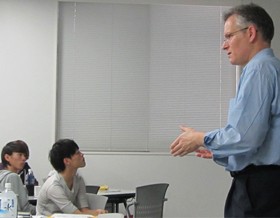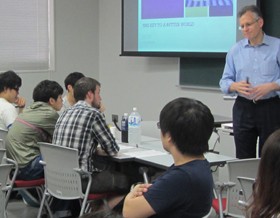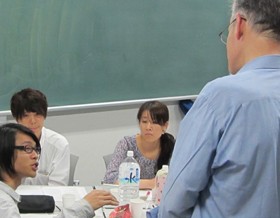A cross-cultural management seminar was held by Professor Dr. Rolf Schlunze on June 20, 2012 with Mr. Duco Delgorge. Mr. Delgorge was born in Prague but brought up and educated in many places around the globe until multinational companies brought him to Japan. Realizing the limits and shortcomings of big business, he founded his own business encouraged by the ideas of E. F. Schumacher published in his book entitled “Small Is Beautiful”. His company is called the MIE Project; M stands for Meaning, I for Inspiration and E for Effectiveness. Compared with other countries, the size of organic packaged food market is very small in Japan but the health concerns of Japanese consumers are creating increasing acceptance for organic food products. Indicating the growing danger of global social, economic and ecological crises ahead, he encouraged students to think about better models than the existing and dominating one. Instead of copying and prolonging old obsolete models they should try to reach the critical mass to move to a better system.
One of our diligent students fluent in English, Yoshimasu, commented that Mr. Duco Delgorge is a great guest speaker and that he was encouraged to change the way of doing business as well. After the workshop most students believed that social business is a great option to better this world and needs to be studied by business students more. To explain about social business, Mr. Delgorge introduced the example of Professor Muhammad Yunus, who was the first to establish a bank as a social business, lending money to poor people enabling them to start their own businesses and sustain their life. Mr. Delgorge got his first job in Brighton, U.K. where Anita Roddick founded the first Body Shop. The students’ attention was brought to other social businesses such as Mondragon, a cooperative with 70,000 employees once started in Spain, Cliff, Patagonia, Balle and SlowMoney.
The students became aware of concerns about the future. Referring to the book The 7 Habits of Highly Effective People by Steven Covey, the speaker encouraged our students to keep a positive attitude, work to find solutions of global problems and widen their circle of influence in the process. He told a German exchange student to try to be part of the solution and not the problem. A female second year student, Eri, learned that thinking about other people and helping each other is the essence of social business. Mr. Delgorge spoke critically about food and other global crises indicating problems like greed in the way we do business. However, he explained to the students when pointing with one finger at others, three fingers point back at ourselves. One student, Suzuka, was impressed to learn that we actually need to change ourselves first in order to better this world. An international student from Hong Kong, Lawrence, learned about the “Occupy Wall Street” movement in New York and found that we need to stabilize our international business relations and wished to learn more about social businesses. Another student, Eriko, felt that sustainability needs to be promoted by Europe and Japan.
A second year student, Hiroki, found that the content of the lecture was very new and inspiring. Some students, such as Emiko, showed their appreciation of the organic food business and hoped that it will spread over the world. Delgorge animated the students to read books about new concepts and ways of doing business that help to better the world, including Riku. Clearly, the students realized that we need to think about the next generation and promote social business as Ryo pointed out. The power of thinking about fair trade as an engine to change the world was discovered by other students during the lecture, Akiko and Shieri. Another fourth year student, Kyoko, noted that in ordinary business classes, social business rarely becomes a topic. This tells us that it is time that we, the university professors, also think about changing. Students like Takashi were glad to join the workshop and stated their appreciation to Professor Schlunze who has been holding workshops with international business leaders since November 2008 at the Biwako Kusatsu Campus.
 |
 |
 |
